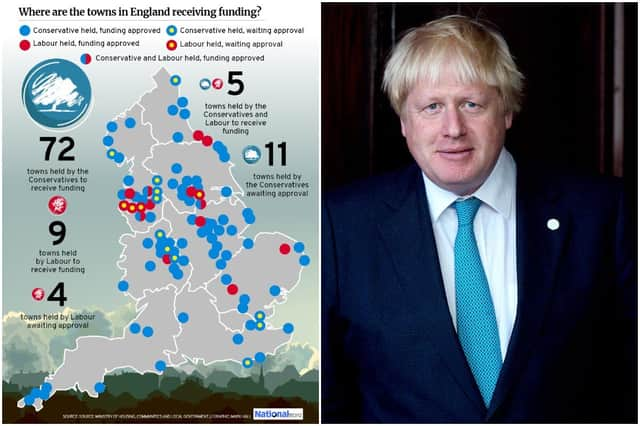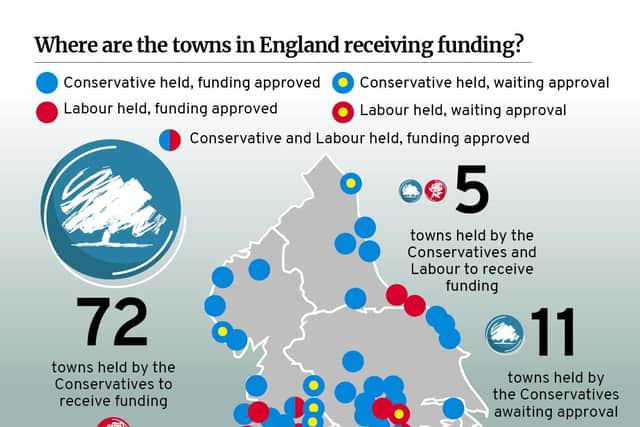‘A whiff of political corruption’: Northern towns and Labour-held seats lose out in £3.6bn Towns Fund scheme


More than 80 per cent of the towns set to receive government funding through the £3.6bn Towns Fund are represented by Conservative MPs.
The Towns Fund initiative was announced in 2019 and is aimed at bringing much-needed government investment to towns in England, based on bids developed locally for specific projects.
Advertisement
Hide AdAdvertisement
Hide AdAmong the 86 towns which have had funding deals agreed so far;


– 72 are Conservative-held
– Five are in areas with both a Conservative and Labour MP
– Nine are in Labour-held seats.
We want to hear from you: let us know what you think about this story and be part of the debate in our comments section below
Senior Labour figures said there is “a whiff of political corruption” to the Towns Fund initiative, which has so far seen £1.6bn worth of investment signed off in Conservative constituencies compared with just over £200m in those held by Labour.
So far £126m worth of deals have been agreed for towns in constituencies with both a Conservative and Labour MP.
Advertisement
Hide AdAdvertisement
Hide AdWhile less than 15 per cent of all the towns selected to bid for up to £25m or £50m in exceptional circumstances are held by Labour MPs, more than a quarter of the 15 towns which haven’t yet had deals confirmed are Labour-held.
As the towns without agreed deals are not guaranteed to receive any funding, this could see the proportion of Conservative-held towns in receipt of funding through the scheme compared with Labour rise beyond 85 per cent.
Breakdown of funding by regions
Ministers were also given a recommendation on the number of towns per region which should be selected.
Regions in the north of England generally got less than officials recommended, while more towns in the South were eligible to bid than was recommended.
Advertisement
Hide AdAdvertisement
Hide AdOverall, officials recommended that 51 of a total 100 towns selected should have been in the North West, North East and Yorkshire and Humber, but only 43 of 101 were selected.
Conversely, ministers were advised to select just 11 of 100 of towns from the South West and South East, but opted to make 17 towns eligible for funding.
This included three towns in Cornwall which had their funding deals announced this week to coincide with the G7 summit in Carbis Bay.
Labour MP for Jarrow in the North East, Kate Osbourne, said the fund should have been used to “invest in those towns which have been completely left behind and forgotten about by successive Conservative governments”.
Advertisement
Hide AdAdvertisement
Hide AdShe said: “It’s no coincidence that the vast majority of these towns are represented by Conservative politicians.
“These appear to be political choices and not wholly driven by need.”
How were the towns selected?
The Towns Fund is administered by the Ministry of Housing, Communities and Local Government (MHCLG), with 101 towns selected in 2019 to bid for funding.
The process of selection and the criteria used have come under scrutiny, with both the Public Accounts Committee and National Audit Office producing reports which were critical of the lack of transparency and impartiality.
Advertisement
Hide AdAdvertisement
Hide AdTo select the towns, officials at the department listed the top 50 per cent of towns in England based on deprivation, then introduced a number of other criteria, before assigning them a score and ranking them within their region as high, medium or low priority.
Rather than the 100 towns which had the highest score all being selected, it was decided that the highest priority towns in each region would be eligible by default, with ministers then free to choose from the others, regardless of their need.
This meant that some towns which scored very high in terms of need lost out.
In some instances, this was down to a desire to spread the impact of the funding equally across the regions, but other cases were due to ministers’ discretion.
Advertisement
Hide AdAdvertisement
Hide AdOne of the highest-scoring, and therefore most in-need, towns to not be selected for the scheme was Salford, in the North West.
Based on a number of factors, including deprivation and economic vulnerability, Salford scored almost twice as much as Tory-held Southport, which has received a deal worth £37.5m, and more than six times higher than Tory-held Cheadle, which will receive £13.9m.
Rebecca Long-Bailey, a prominent figure on the left of the Labour party who came runner-up against Keir Starmer in the 2020 leadership election, is the MP for Salford.
She said: “It is quite staggering that as the 18th most deprived local authority Salford has not qualified for levelling up funding yet numerous Conservative marginal seats have and worryingly the process has been shrouded in complete mystery – despite allocating funding adhoc the Government has still not published its promised levelling up strategy.
Advertisement
Hide AdAdvertisement
Hide Ad“The Government must be transparent about how areas have been selected for ‘levelling up’ and ultimately they must use deprivation data to develop long term regional industrial strategies to effectively target levelling up funds.”
‘Pork barrel politics’
The government has been accused of leveraging investment and infrastructure spending in targeted areas for electoral gain, sometimes referred to as ‘pork-barrel politics’.
This was a significant theme in the Hartlepool by-election, with Labour’s candidate Paul Williams describing the Conservatives’ tactics as “a protection racket,” over claims the town would only receive investment with a Tory MP in power.
Hartlepool was among the latest group of places to have its Towns Fund deal, worth £25m, agreed and announced.
Advertisement
Hide AdAdvertisement
Hide AdFormer Shadow Chancellor and Labour MP for Hayes and Harlington, John McDonnell, said that a balanced approach across the regions for the distribution of funding is to be welcomed, but there is a “whiff of political corruption” about the scheme.
He said: “Nobody begrudges any town receiving government assistance. In fact the whole policy of making sure every area gets a fair distribution of investment was a Labour policy I first announced nearly 5 years ago.
“The problem with the government’s approach is that the decisions are not being taken either fairly or based upon needs. That’s why there is a whiff of political corruption about it.”
He added: “If Johnson goes along this path he will divide the country and eventually provoke an angry backlash.”
Which towns have been selected?
Advertisement
Hide AdAdvertisement
Hide AdThe following towns have been selected to be able to bid for funding through the Towns Fund. Those marked with an * are yet to have a deal announced, and may not yet receive any funding.
- Barrow-in-Furness
- Bedford
- Birkenhead*
- Bishop Auckland
- Blackpool
- Bloxwich*
- Blyth*
- Bolton
- Boston
- Bournemouth
- Bridgwater
- Brighouse
- Burton upon Trent
- Camborne
- Carlisle
- Castleford
- Cheadle
- Clay Cross
- Cleator Moor
- Colchester
- Corby
- Crawley
- Crewe*
- Darlington
- Darwen*
- Dewsbury
- Doncaster
- Dudley*
- Glastonbury
- Goldthorpe
- Goole
- Grays*
- Great Yarmouth
- Grimsby
- Harlow
- Hartlepool
- Hastings
- Hereford
- Ipswich
- Keighley
- Kidsgrove
- King's Lynn
- Kirkby-in-Ashfield
- Leyland
- Lincoln
- Long Eaton
- Loughborough
- Lowestoft
- Mablethorpe
- Mansfield
- Margate
- Middlesborough
- Millom*
- Milton Keynes
- Morley
- Nelson*
- Newark-on-Trent
- Newcastle-under-Lyme
- Newhaven*
- Northampton
- Norwich
- Nuneaton
- Oldham
- Penzance
- Peterborough
- Preston
- Redcar
- Redditch
- Rochdale
- Rotherham
- Rowley Regis
- Runcorn*
- Scarborough
- Scunthorpe
- Skegness
- Shipley
- Smethwick
- Southport
- St Helens*
- St Ives
- Stainforth*
- Stapleford
- Staveley
- Stevenage
- Stocksbridge
- Sutton in Ashfield
- Swindon
- Telford
- Thornaby-on-Tees
- Tilbury*
- Todmorden*
- Torquay
- Truro
- Wakefield
- Walsall
- Warrington
- West Bromwich
- Whitby
- Wolverhampton
- Worcester
- Workington
The MHCLG has been approached for comment.
Comment Guidelines
National World encourages reader discussion on our stories. User feedback, insights and back-and-forth exchanges add a rich layer of context to reporting. Please review our Community Guidelines before commenting.